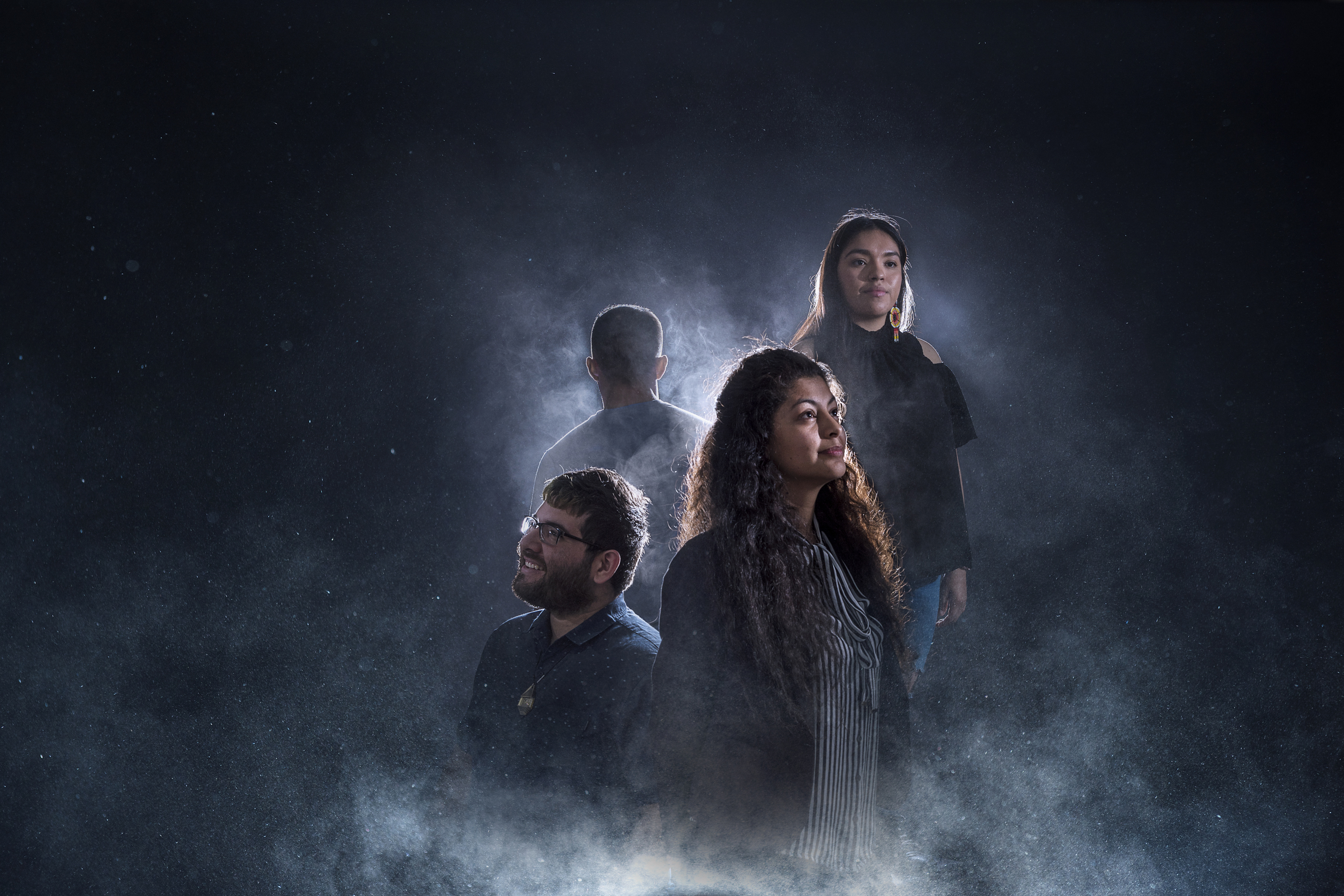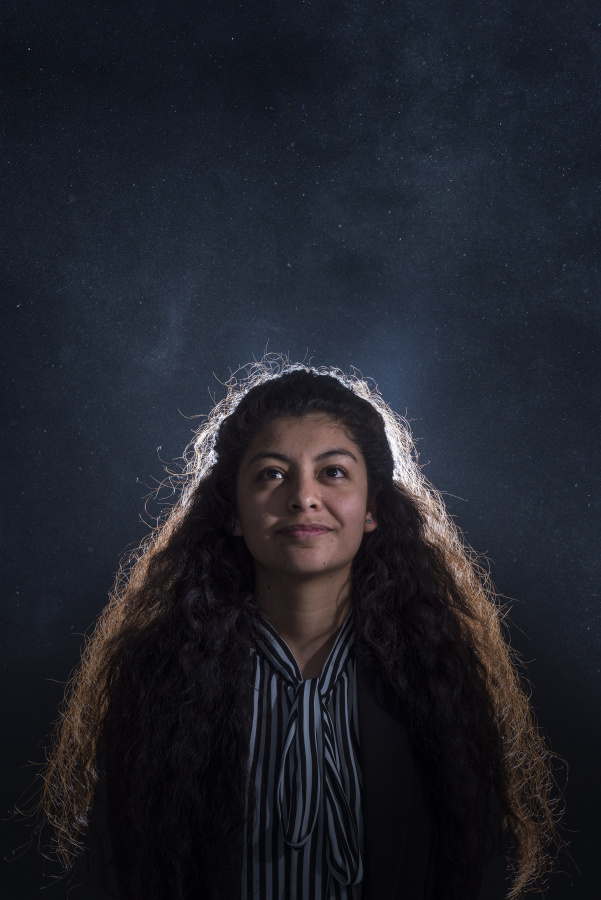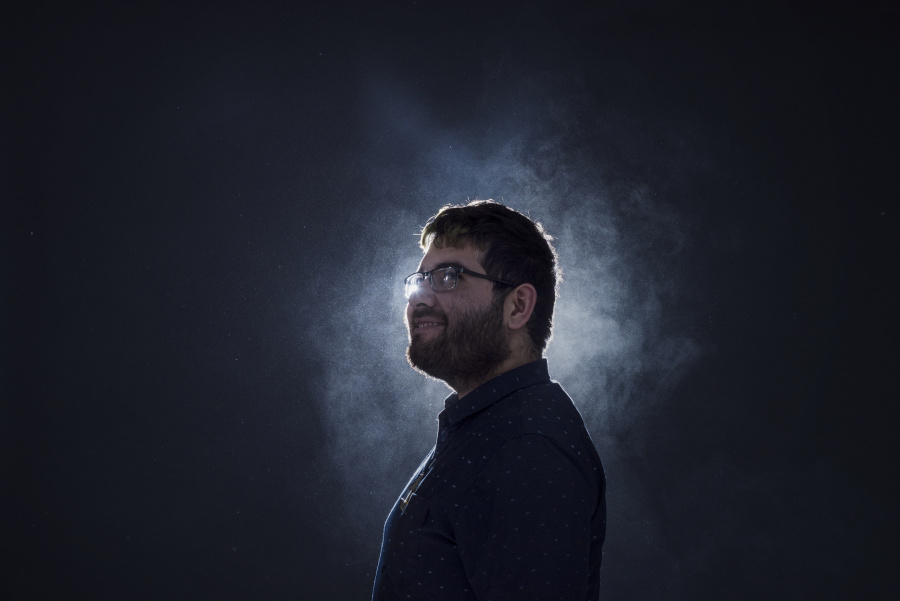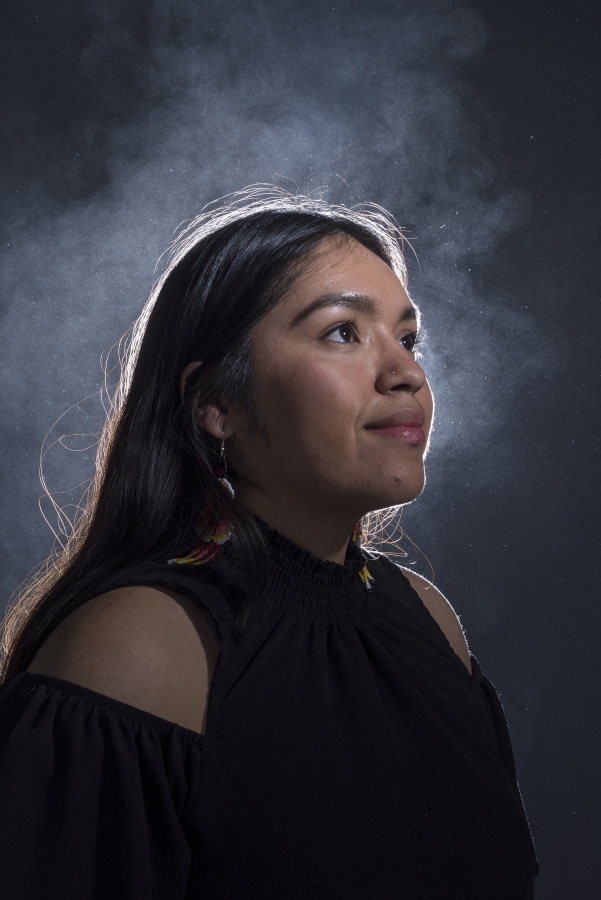Restless Dreamers

Freddy, Aldo, Lorena, and Karen (counter-clockwise from top left) took a risk in sharing their stories as undocumented immigrants. (Jason Halley/University Photographer/CSU Chico)
Behind this story: We asked our undocumented students to take a risk by sharing their stories. The consequences of coming out publicly could be devastating, not just to them, but to their families. With DACA’s fate uncertain and the national immigration discussion at a boil as of publishing time, we offered anonymity to these four outstanding students—an unprecedented step for Chico Statements, the University magazine for which this story was produced.
Three declined it, tired of hiding. A fourth accepted, afraid he might lose everything. Staying in the shadows, he represents countless other Dreamers who are not able to speak publicly about their status. No last names are used in the story, to offer all a measure of protection.
***
Freddy’s coyote, a man he’d never seen before, picked him up in a car just south of the Mexican border the day he crossed from Tecate to San Diego.
The driver handed Freddy a cell phone and told him to expect a call soon, and when it came, to listen and repeat the voice on the line.
The driver sped toward the border. The phone rang. Freddy answered.
“GO. GO!”
The coyote tore through the rocks and dirt and brush, racing 17-year-old Freddy across the border. It was only 5 p.m. but, in late December, that meant darkness. The driver made his dash with the car’s lights off, rumbling through the desert, pushing 80 mph toward the glow of the freeway. The voice on the phone begged them forward.
That three minutes seemed like an hour to Freddy, but the road soon smoothed. The driver was still hauling up the highway, but he had flicked the headlights on and finally looked over at Freddy, who was terrified and exhausted. The coyote, who earned $3,000 for this transport, urged him to relax.
That night, Freddy slept on United States soil.
Many undocumented immigrants living in the United States have known no other home. Millions arrived as children and have lived in the shadows their whole lives. Others, like Freddy, came here under circumstances even murkier. They arrived in cars—or trunks of cars, by foot, hidden in truck containers, or maybe in plain sight, under the guise of visiting family.
About 800,000 have enrolled in Deferred Action for Childhood Arrivals (DACA), a two-year renewable deferment of deportation for qualifying individuals who entered the country as minors. First introduced by President Barack Obama in 2012, DACA allows the recipients, who entered or remained in the country illegally, to get work permits, attend school, and serve in the military.
Tens of thousands DACA recipients are students enrolled in California’s public higher education systems. Of the estimated 9,500 undocumented students in the California State University system, 4,000 in the University of California system, and 50–70,000 in the state’s community colleges, about half hold DACA status, according to EdSource, a nonprofit journalism website.
The fate of these students hangs in question. Changing federal immigration policies, including the rescinding of DACA in 2017, and a turbulent national attitude toward the topic leave DACA students and Dreamers, like Freddy, anxious and uncertain.
Here, four Chico State Dreamers share what is at stake.
Lorena

“My family was poor—is poor—and so we’ve never had a lot of food or resources,” Lorena says. “But in Mexico, it was worse. It can be very difficult here, but there is the opportunity to have a better situation.”
For Lorena, that means room to grow, to explore, to share. A bilingual liberal studies major, she dreams of inspiring young people and teaching them to be thirsty for knowledge, above all else. She knew, even before she left Mexico at 10 years old, that she wanted to be a teacher who could make an impact in other people’s lives. For Lorena, to educate is to share the world’s treasures: language, history, culture, art, nature.
Not surprisingly, her limited spare time outside of her full class schedule and work at the Chico State Dream Center is filled with spiritual sustenance. Lorena is happiest when she can bury herself in books or show friends a new hike. She has a fondness for country music, even though her friends make fun of her for it. And she loves to keep things clean. Tidying her house is therapeutic.
But life seldom feels so carefree, so light, for Lorena.
“If you were to talk to me three years ago, I would be terrified to tell you I’m undocumented,” she says. She doesn’t fidget or break eye contact here, instead leaning forward, her voice feather-light, low, and sharp with intention. “And many people, my parents, are still terrified.”
Lorena grew up with her grandparents near Guadalajara while her birth mother lived and worked undocumented in the United States to send money back to them. As a child, Lorena saw her mother only a few times, each for a couple of weeks at most, when she returned to visit. For those early years, Lorena called her grandparents Mom and Dad. And then, when Lorena was 10, Mom died of leukemia.
Shortly after, Lorena came home one day to a stranger telling her it was time to leave. The man turned out to be her stepfather. He loaded Lorena and her siblings into a car and took them through Tijuana to Los Angeles. She had no idea she wouldn’t see her grandfather again.
They continued north to reunite with her mother in Vallejo, where they stayed for almost four years before moving to Corning for a more rural life like they’d been used to in Mexico. But as Lorena finished high school, her stepfather was deported, leaving her stay-at-home mom with no career prospects to care for a houseful of children. Lorena had to work to help support her family, but she wouldn’t cut her education short to do it. She enrolled in DACA, then moved out on her own in 2014, to Chico.
Lorena attended Butte College, riding the bus to class and working in the campus welcome center. With DACA, she could work, pay taxes, live on her own, and provide for herself and her family while learning. She later earned her driver’s license and acceptance to Chico State, where she has built a life around classes, friends, and fighting for undocumented people.
As long as DACA’s status is uncertain, all she’s worked for twists in the wind.
“It’s really eye-opening, what can be taken away from you,” Lorena says. “It’s not just your documents or whatever—it’s opportunity. It’s your life.”
Aldo
It was Aldo’s mother’s dream for her three children to have it better than she did, and the best, safest opportunity for them to do that was in the United States.
“My parents always believed that education is how you escape poverty. But in Mexico, you don’t have the ability to climb the ranks. There’s no economic mobility,” Aldo says. “You see teachers with their master’s degrees and they can’t find work. That’s the reality there.”

Upon arriving in California, Aldo set out to shine, earning countless academic awards, a double associate’s degree, and a prestigious neuro-nursing research internship at Enloe Medical Center.
Outside of his studies, Aldo’s focus is helping young Dreamers who don’t know their options or rights. The anthropology major works 20 hours a week at the Chico State Dream Center, on top of tutoring math and the Enloe internship he recently completed. After graduation, he envisions a career where he can continue to assist underserved populations as a medical “culture broker,” providing care and support for people from different ethnic and cultural backgrounds who have specific health care needs.
He has also followed all the rules that come with DACA. Aldo has paid taxes since he became eligible to do so. He is registered for the draft for the Armed Forces. His older sister, who recently became a resident, has petitioned for his citizenship. Aldo’s court date to submit his application—with no guarantee of acceptance—is 2052.
He would be 63 years old.
“Everyone says, ‘Do it the right way.’ I’m doing it the only way you’re giving me to do it,” he says. “I think of myself as an overachiever. I have great merit. They tell you that if you’re good, if you’re law-abiding, you should be a citizen. I agree.”
It’s a frustrating situation for a standout student like Aldo, but he’s got an easy smile and conviction in his purpose. His voice was among the loudest and proudest at a campus Dreamers rally in September, when he cried out, “We deserve to be here, and we’re done hiding.”
And he’s outspoken about the migrant community’s inherent responsibility to also stand for LGBTQ+ rights and for marginalized groups to support undocumented people.
“Watching the allyship in Chico grow has been amazing,” Aldo says. “Allies being receptive to my situation is the greatest thing about this school.”
Aldo and his husband, also undocumented, met in 2011, lobbying for the California Dream Act in Sacramento (it passed and is now known as Assembly Bills 130 and 131). It wasn’t until months later, after they’d met outside the Capitol’s hearing room, that they discovered they lived just 12 minutes away from each other in Orange County. They married in 2015. They’re mostly homebodies when they aren’t advocating, and their ideal date is staying at home together and watching anime. It’s a happy life but not without its struggles. Aldo’s husband is undergoing chemotherapy for leukemia, diagnosed two months after he proposed to Aldo. They’ve balanced that battle with the inevitable what-if conversation that always looms over their lives.
“Being visible comes with risks. If one of us gets deported, we love each other too much to ask the other to come with us. There’s nothing for us in Mexico,” Aldo says. “We both suffered, we both grew up with limited finances, and we changed things here. Our families didn’t risk everything for us to go back there.”
“If I were to be separated from my family,” he says, “my world would be gone.”
Karen

It was relatively easy in the early ’90s to cross the Mexico-United States border with someone else’s immigration papers, and that is how Karen and her family came to California when she was 2.
At first it was her father, who made the move from Mexico City to San Diego by himself. Only 23 years old, he felt overwhelmed. He had developed diabetes and assumed the medical bills that come with it. Karen, the youngest of three children, had just been born, and in Mexico, elementary school costs money he did not have. He needed to make a change. His plan was to earn money in the United States to support his young family, but within a year, it became clear that his kids needed their dad.
Karen’s mother and the three children crossed together, driving all night to reunite. Karen says the earliest memory she can recall is opening her eyes, from a night of sleep in the car, and seeing her father’s smiling face.
“People criminalize our parents for bringing us here,” she says. “But they put us in the best position they could to grow and survive. I love my parents and thank them because they left their whole lives behind for us. How can you call a parent acting out of love a criminal?”
A senior set to graduate this May with a degree in exercise physiology, Karen aspires to be a paramedic and aid those who need it most. She currently interns as an exercise physiologist at an area hospital. She remembers her grandfather, who died of cancer years ago in Mexico, telling her he wasn’t worried for his health because one day Karen would be his nurse and take care of him. With her father now suffering from renal issues associated with his diabetes, caring for people like them is her purpose.
“Within any underserved community, a lot of us don’t know how to access medical services,” she says. “Growing up, I don’t remember going to the doctor, and now that I’m older I realize it’s just because we didn’t know how to access it. We used home remedies. We grew up drinking tea if we had the flu. But people like my dad need real health care.”
The uncertain longevity of DACA overshadows her goals. Karen’s fear is that her hard work will be for nothing if she is sent “home”—a misnomer, she says, because she has not a single memory of Mexico. The United States is where she’s built friendships, found her partner, and learned to ride a bike. She celebrates the Fourth of July every year.
“This is my home. What’s not American about me?” she asks. “What makes us different?”
Her path to citizenship is also unclear. The most direct option would be to marry her partner of four years, who does have legal status. They have been together since their senior year of high school in Sacramento, and she says they love each other. She shares his passion for baseball, and he joins her family trips across the Western United States to watch soccer, her first true love.
But Karen doesn’t want to get married yet. Not out of fear. She doesn’t want to get married on a deadline.
“We love each other and want to be together,” she says. “But I’m not getting married just to be a citizen. I want to do it when the time is right, to do it on our own terms.
Freddy
Two days before his border crossing, Freddy cried silently on the plane, and landed in Tijuana around noon. He taxied an anxious hour to Tecate, and spent the night with a family he didn’t know. When the teenager finally made it to Northern California to live with his uncle, he had to sleep on the floor because there wasn’t a bed for him yet. He felt homesick, and he cried again.
But he couldn’t go back. Freddy’s memories from Mexico stay with him, mostly unwelcome. He still has dreams of the years he would go to school without a lunch, and go to bed without eating dinner. He hears himself cursing, furious at his mother for not being able to feed him. He recalls being just a boy and working in the fields, pulling weeds very late and often very early, sometimes dodging rattlesnakes, always hungry.
“My dad was brutal and savage,” Freddy says. “He did not care about education, only work. I could never have a future if I stayed there.”

Five days in 2003 changed Freddy’s life. His uncle, misguidedly thinking Freddy’s presence in the United States would accelerate his green card application process, told his parents to send him across the border. Seeing an opportunity for their son to make more money for the family, they agreed, and Freddy was in California in less than a week. He never had a choice.
Freddy was slowly learning English and progressing in high school, but his situation was still unstable. When his uncle died of lung cancer just two years later, a local family was his saving grace. They heard his story and, instead of reporting him, sheltered him through the rest of high school.
“Living with an American family taught me the value of acceptance, empathy, and compassion,” Freddy says. “Having their support gave me hope and strength when I had high aspirations but I was low on resources.”
After finishing high school in 2006, he enrolled at Butte College, where he faced further struggles. He still was trying to grasp the language and failed five courses, two of them multiple times. He earned his living wages under the table; he butchered meat for a grocer in the evening, and he chopped wood for an old man in the morning. He woke at 5 a.m. daily to catch the bus to Butte, and he pedaled his bike five miles outside of town to work when he was done with class. He found another full-time job in a local processing plant and soon struggled to stay awake in class. He kept himself going by checking out library books—collections of positive quotes or success stories.
“It never crossed my mind to give up,” Freddy says. “I knew I’d fail some classes, but I could do them over. I also knew I was learning and growing.”
He paid his full tuition out of his own pocket and still sent money back to his family in Mexico.
Freddy finally graduated from Butte in 2014, earning his associate’s degree. Then, with guidance from Chico State’s Dream Center, he was accepted to the University, where he earned his bachelor’s degree in social work and is now pursuing his master’s. Freddy aspires to help troubled youth, many with criminal backgrounds, get back on productive and healthy paths through rehabilitation programs and counseling.
A toothy grin sweeps over his face as he puts it into words: “I’m living my dream.”
“If you come to this country, you came here because you want to contribute and get ahead in life,” he says. “I know who I am and what I’m capable of.”
That self-image, Freddy says, is the American dream, embodied. He has no desire to see Mexico again; it would feel more alien than the United States first did. When he imagines himself as a child again—hungry, angry, desperate—those memories don’t come to him in Spanish anymore.
“I am who I am because of my experiences in America,” Freddy says. “The voice in my head is American. I dream in English.”
***
Related reading: Alumnus and lawyer Sergio Garcia—the first undocumented immigrant in California to legally be granted the right to practice law—addresses myths related to Dreamers and immigration.


